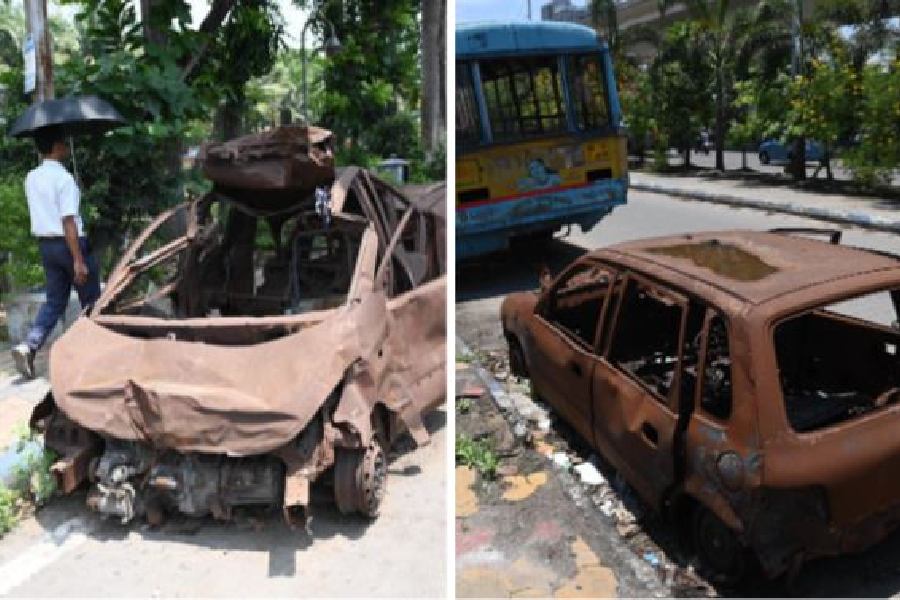Vehicles seized by police in connection with crimes or those that met with accidents are parked along a service lane of VIP Road, in Patuli off EM Bypass, in Bhowanipore and other places in the city, making the areas resemble dump yards.
On Friday, The Telegraph spotted at least half a dozen cars and a bus rotting away on the service lane of the airport-bound flank of VIP Road. Most of them had a thick patina of rust and many had no air in the tyres indicating they had been dumped there several weeks ago.
The area where the cars are parked is a stone’s throw from the Lake Town traffic guard. Whenever a vehicle is seized, it is towed to the service lane and dumped there, Lake Town residents said.
Among the parked cars, this newspaper spotted the Mahindra XUV 300 that had hit a motorcycle before ramming into a truck at the Dum Dum Park intersection in April. Two on the motorcycle, the driver of the car and a woman in the front passenger seat had died in the crash.
The windscreens and window panes of most of the vehicles were smashed, exposing the interiors. Some had missing tyres and wheels. The mangled remains of the cars had multiple depressions on the roofs and bodies where water had accumulated since the recent spell of rain.
"Water that accumulates in these vehicles is hard to spot. Since they are not cleaned regularly, water can remain undisturbed for more than seven days, turning into potential mosquito breeding grounds," an entomologist said.
The Aedes aegypti mosquito, which transmits the dengue virus, can breed in a spoonful of stagnant water, the entomologist said.
Across the city, several places, especially areas near police stations or traffic guards, have such rotting vehicles. These vehicles that remain parked along the roads become health hazards and eat up road space for motorists.
An official of the South Dum Dum Municipality, which has Lake Town under its jurisdiction, said the vehicles had eaten into a portion of the service lanes. “We have been spraying larvicide in and on the cars whenever possible,” he said.
A senior officer at Lalbazar said any vehicle that has met with an accident becomes part of the crash investigation and is generally parked near the police station or traffic guard of the area where the incident happened.
“Investigating agencies need these vehicles to conduct various tests, including mechanical tests. In case of minor incidents, vehicles are not seized,” said the officer.
In case of accidents involving multiple vehicles, all of them are kept in the possession of the investigating agency before the final investigation report is submitted before a court, he said.
“Once the case is tried in court and the driver is absolved of the crime or asked to pay a fine, he or she has to submit an appeal to the court to get the vehicle back."
Such a process generally takes at least three months, a senior officer said. “Every police station or traffic guard has limited slots so vehicles pile up. There is little option other than to park on roads around the police station or traffic guard,” he said.
If a car is seized in connection with a crime, it becomes part of the seizure list and forms a crucial part of evidence often used to reconstruct the crime.
“In these cases, till the final chargesheet is submitted by the police, the vehicles are kept near the police station to facilitate forensic tests to prevent tampering. Crucial evidence can be lost if the car is washed after a crime is committed in it,” an officer of the Bidhannagar commissionerate said.
Getting such a vehicle released can take several months.
The police also seizes commercial vehicles for plying without requisite permits.
In Salt Lake and New Town, most police stations have such cars parked in front of them or on empty plots nearby.
A senior official of the Bidhannagar Municipal Corporation said they were aware of such parked cars.
“Once the court gives clearance to return these cars to the owners, we will remove them. We are looking for a proper space to keep such cars while investigations are done,” said Indira Mukherjee, deputy commissioner of traffic, Bidhannagar commissionerate.
